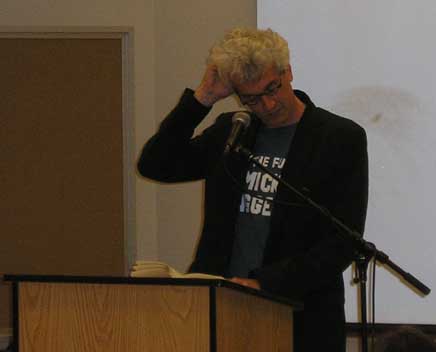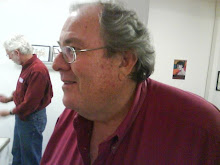
Joshua Clover gave his hometown reading in Davis last night. The room was packed full of listeners ready to hear Clover’s wit and sarcasm (tinged with sincerity), his intelligence and cultured sensibility (particularly of those things European). He started things off with a dedication to those who don’t write about their daily life. Then, a bit more sincerely, he dedicated his reading to his students at UC Davis who have been informing and shepherding his work for the past several years during the writing of his new book The Totality For Kids.
Somewhat surprisingly, Clover led off the evening reading from Brecht. He read “Parade of the Old New,” the first of Brecht’s “Five Visions” that were written in 1938. The piece projected its prescience during the line “I saw the old approaching, but it appeared as the new.” So this means Brecht was actually the first postmodernist?
The first piece that Clover read which he authored was Ceriserie which was described as a list poem. But this poem did not operate as a normal list of items seen and experienced in the real world. Clover’s list betrays his interest in the Francophile world and the world of cinema, literature and music. His list reflects what Diane Wakoski used to refer to as the archaeology of books and movies.
Clover then read “The Other Atelier” which Clover related grew out of his attempt to translate a poem from French into English and then back into French. The failed translation project (much too humble was Clover in his characterization of his attempt as a failure) surfaced, “The shift from modernism to world systems is stored in the new candy-colored currency”
Clover continued with another poem from “Totality” entitled “Chreia,” which grew out of Clover’s research into the surrealist project for two particular cruets in Paris to be filled with semen and menstrual blood. These were jusxtaposed against the twin towers of the World Trade Center so that images of “cops in kevlar” and the “expectation of terror” also swirled in the mix.
A short anarchist bonbon was offered next entitled “Proposal to Improve Museum Gift Shops in Paris” which included some mention of terrorist bombs being planted there.
“Two Poets are Reading Machiavelli When They Should Be Reading Clausewitz” was next followed by a poem written for Elliot Smith (who apparently has about 5 or 6 good songs which is better than most who only have 2 or 3 if they’re lucky . . . according to Clover). It is in this poem that Clover penned my favorite line of the evening, “We lie down in concepts and wake up in categories”
“Feral Floats the Form in Heaven and of Light” was the next one up, where “the famous and the dead have learned to fall between our eyes and their forms in heaven”
Clover then told of how growing up in Berkeley he remembered going to Sproul Plaza and vaguely having an impression as a very small child of the Free Speech movement in 1964. From this arose, “For the Little Soldier” which is surprisingly autobiographical at first, much more so than most of Clover’s readers might suspect. In this piece Clover also extends this truism: “You do not know a town until you know where the drunkards go to piss.”
One of my favorite parts of the evening was when Clover read from the index at the back of the book. The editors of “Totality” wanted to provide the reader with some idea of what was “borrowed” material, so Clover, enlisting the help of the inimitable Andrew Joron, wrote up an index for the book, which as far as I can tell is accurate. Clover boasted it is the only book of poems with an index. [Counterexamples are welcome.] Especially big laughs were had with “Bonaparte, Napoleon” and “Boone, Debbie.”
Jumping on the band wagon of writing in established forms, Clover revealed he had scratched out a sestina entitled Das Kissenbuch where the Tzu brothers (not really) Lao and Sun engage each other in a Kunst des Krieges.
The last poem of the evening was an as-of-yet-untitled one which Clover admitted he had put the finishing touches on that afternoon. He prefaced the poem by saying that most of his poems are about cities and money. In the poem he paraphrased William Carlos Williams when he said “No ideas but in money,” a wry shift on that regular motif.
Afterward, I was honored that Clover should dub me “Dude Man” (most likely from the lovely vintage thrift store Guatemalan belt I was wearing . . .what can I say? Only clothes from the 70’s fit me.) The crowd milled about and was deposited on the street where I overheard: “Yeah, Joshua is a good reader, but he doesn’t like to read” Don’t miss the next time. It might not come around all that much.





















No comments:
Post a Comment